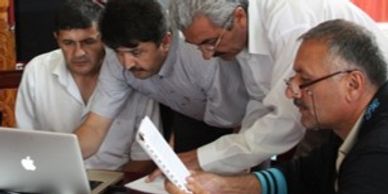Services
simulations
leadership development
leadership development

The simulations we create are designed to challenge staff members and enable them in a controlled setting to deal with many of the issues and concerns that their organizations must confront in actual operating environments.
From simple tabletop exercises in which learners seek to grasp the proper application of policies and procedures to more complex, field-based exercises in which staff members are required to test systems and their own individual competencies, simulations offer an exciting - and memorable - means of testing systems, identifying gaps, and handling complex relationships.
leadership development
leadership development
leadership development
Strong, effective leadership at all levels is essential to ensuring success of the organization's new directions, policies, or procedures. To ensure that essential leadership is available in times of crisis or of substantial change, organizations are increasingly making an commitment to the development of leadership competencies.
Competency in emotional intelligence, negotiating and communications skills, an ability to apply situational leadership appropriately - these are the keys to effective leadership in the high stress, dynamic environment in which so many humanitarian organizations function today.
evaluation
leadership development
executive coaching

We have evaluated initiatives of numerous international organizations - including emergency operations, management training programmes and organizational change efforts, analyzing agreed logic models and applying accepted criteria to assess outcomes and impacts.
These initiatives generally include survey design and administrative and development of key informant and/or focus group interview guides. We have, as well, carried out a number of emergency needs assessments to support decision-makers with mission-critical information as they start up - or phase down - agency responses.
executive coaching
executive coaching
executive coaching
We use the classic GROW approach to coaching in our efforts to help leaders and managers work through their professional challenges. We work to build a close coaching relationship grounded with an absolute guarantee of confidentiality.
The GROW approach is a powerful means of facilitating the coaching conversation. It permits coachees to set goals, analyze current realities, explore new options, and consider the best way to move forward and meet the challenges they confront.
Its flexible approach has enabled leaders from a wide variety of backgrounds and experiences to explore new paths and ideas, and ultimately identify workable solutions.
facilitation
executive coaching
ONLINE learning

We are often requested by organizations to facilitate strategic planning meetings, senior management retreats, and change management processes. In so doing, we adhere strictly to adult-learning principles:
We take it as a given that adults are self-directed learners, and that each brings to the table a wealth of experience and knowledge that merits respect by all present. In managing group dynamics, we consider that adults are goal-oriented, practical and want to see the relevancy of each activity, exercise or discussion.
ONLINE learning
executive coaching
ONLINE learning

In recent years, much of of our work has been the design and delivery of online learning programs - for all levels, from executive teams on down - to enable needed organizational changes to be well-communicated, understood, put into practice, and institutionalized - no matter how remote the learner.
We adhere strictly to adult learning principles with learners actively involved in the online training delivery - whether through self-directed online learning, small group activities, or presentation at a distance of their own professional experiences and knowledge to their participants.